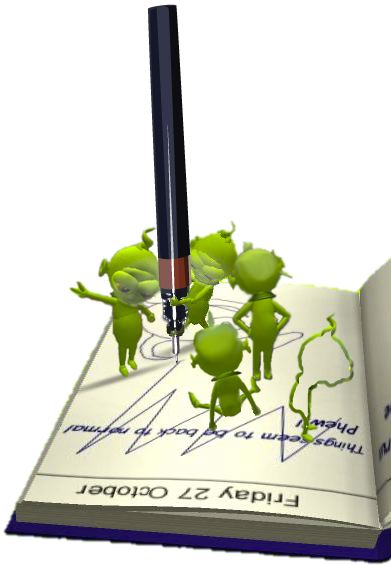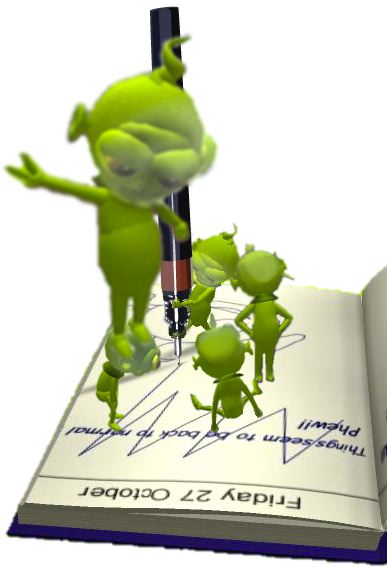Part 3: Handling Problems

It is important to understand that even when the group is having difficulties, the members should not expect the instructor to fix everything. A good rule of thumb is to try to solve the problem at least three times as a group, or with the assistance of another group, before calling on the instructor.
Group work is not without problems. When a group is functioning well, it often brings out the very best in its members. But when a group is not functioning well, it can be stressful for everyone.
Various things can and will go wrong in any cooperative learning group. The next section outlines some problems that may occur within groups. Read through these to get a general sense of what could happen and what possibilities exist to help resolve problems.
Problem: A group member fails to attend meetings.

A common problem in many groups is that one of the members fails to attend a meeting. Often there are valid reasons why a person doesn't show up. However, it can result in non-productive time for other members because each person is a key to the group's success. Everyone is dependent on the input and involvement of the whole team. Consequently, when one member of a cooperative learning group is absent everyone suffers.
Talk with the person who is missing meetings - he or she may have an excellent reason. If not, remind the person how important he or she is to the whole group's success. Encourage the person to join you. If all else fails, talk to your instructor as last resort and explain how you have tried to resolve the problem. Your instructor may have other ideas and, in the end, he or she has the power to give grades.
Problem: A group member comes to meetings unprepared.
It happens - sometimes students aren't prepared for class or for cooperative learning group meetings. This prevents the group from being effective and leads to other members taking up the slack. Continued lack of preparation can lead to conflict in the group and unachieved goals.
Some "slackers" may not even know they fall into this category. Have everyone in the group evaluate each other - in fact, your instructor may do this at any point in time. Having students evaluate each other quickly identifies "slackers." If stressing the importance of being prepared for meetings doesn't work for the group, a little reminder that group evaluations are part of the overall grading process probably will.
Problem: A group member is unwilling to carry out the goals or tasks of the group.

Sometimes groups have individuals who resist and behave inappropriately in an effort to hamper the process. They may make comments, such as "Why do we need a team name?" or "This is a waste of time," or "Let's call ourselves the Five Time Wasters." Resistance can come in many forms, such as being boisterous and disruptive. Or sometimes a group member will become silent and passive.
These behaviors can prevent a group from accomplishing its goals.
Try some role-playing. Your instructor may have shown you this technique already. If not, you may want to have him or her help you through it the first time. Ask a person in the group to act as the resistant member. The student with the unproductive behavior often sees herself or himself in the scenario and changes his or her behavior. After the role-play, the group should discuss the experience, talk about the situation, and invent effective ways to deal with it. You may help other groups by reporting the results of this exercise to the whole class.
Problem: During this exercise, a member of the group is unwilling to assume one of the five roles.
Everyone in the group is quite suited to some of the cooperative learning roles more so than they are for others. For example, a student who is assertive by nature may feel quite comfortable as a Taskmaster, but someone who is more introverted may be very reluctant to take on that position. Because of different styles and personalities, a group member may refuse certain roles.
Usually unwillingness to perform a role is due to lack of experience. Once a group member has gained exposure and experience in a variety of situations, he or she will feel more at ease with any of the five roles. One way in which to provide this experience is to have everyone play all five roles, but only for a short time. Take one short task or action item and deal with it. Then rotate around the group with a different short task until everyone has gotten a taste of what each role is like. Your instructor can help you make sure the roles are being enacted correctly and clarify any questions you may have.
Problem: A group member has difficulty understanding the material or communicating with other members of the group.
Someone may be slow to understand specific content at one time or another and this may occur for many different reasons. Some students feel a great deal of pressure in group situations because their comprehension of the material may not be the same as that of other group members.
Communication problems may not be due to a lack of understanding but can simply be a result of nervousness in a group atmosphere. Being nervous often hinders effective communication. It is said, "a chain is only as strong as its weakest link." This statement applies to group situations where one or more members are struggling to understand or communicate in a group setting. If one member is struggling, the effectiveness of the entire group is compromised because the group's success is dependent on the contribution of each member
The solution is simple - always help each other. Every member of the group will struggle at one time or another. The result of helping each other and building a sharing and caring environment will be a win-win situation for everyone.
Problem: One person tries to dominate the meeting, or some individuals may say little to nothing.
 Some people are talkers who believe the whole world is interested in their particular point of view, while others prefer to keep to themselves. We all have different personalities and characteristics. But, sometimes when these very different personality types come to the surface in a small group, communication can be affected.
Some people are talkers who believe the whole world is interested in their particular point of view, while others prefer to keep to themselves. We all have different personalities and characteristics. But, sometimes when these very different personality types come to the surface in a small group, communication can be affected.
The goal of cooperative learning is not to change peoples' personalities! So, the role of the Gatekeeper is a good model for handling these issues. Shy people may need to be prompted, and the talkers may need to be reminded to listen. It may take a little while for people to get used to being drawn out or "shushed," but as the group develops, these little Gatekeeper's prompts will seem less intrusive and become a natural part of each meeting.


